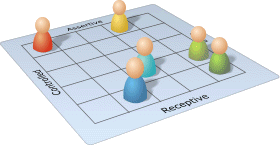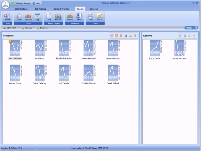Understanding TeamsOne of the things that DISC models particularly well is the way that a person will interact with others, and a natural development from that fact is an examination of a individual in the context of a team. 
Discus includes a new extension of DISC theory designed specifically to examine a members attitudes towards work in a team, and to identify the likely types of role that individual will adopt. Discus doesn't stop with the individual member: it includes a complete team profiling suite, that's capable of describing the make-up of any team in DISC terms, and analysing the team as a whole, its leadership and the relationships within it.
Beyond describing and assessing teams, Discus also includes a Team Profiler - a tool that can actually construct ideal teams. Based on a behavioural definition that you provide, the Team Profiler will search through all the combinations of DISC profiles it can find to locate the best possible matches to your ideal team definition. Four Team FactorsThe four factors used by Discus to describe teams are derived from the standard DISC factors. They are: Unlike ordinary DISC factors, each of these also has an 'inverse' value to complement the main team factor: There are also a host of 'subfactors' deriving from these: the Understanding Teams handbook supplied with Discus explains all these terms in detail. Find out more |
DISC reference libraryBecome a DISC expert with our extensive online DISC reference library. Team building with DISCExplore the theory behind modelling teams using the DISC technique. |

Features
Reports
Branding
Software
Pricing
Training
Languages
Individual Reports
Agency Opportunities
DISC: A Layman's Guide
What is DISC?
Video: Introduction to DISC
DISC Profile Interpretations
DISC Factors
Team Building with DISC
History and Development of DISC
Personality Types
Applications: Putting DISC to Work
Validity and Reliability of DISC
Knowledge Base
(214) 613-3983
E-mail us
Skype us
Contact Details
(214) 613-3983
Features
Reports
Branding
Software
Pricing
Training
Languages
Individual Reports
Agency Opportunities
DISC: A Layman's Guide
What is DISC?
Video: Introduction to DISC
DISC Profile Interpretations
DISC Factors
Team Building with DISC
History and Development of DISC
Personality Types
Applications: Putting DISC to Work
Validity and Reliability of DISC
Knowledge Base
(214) 613-3983
E-mail us
Skype us
Contact Details
Factfile: team building with DISC
Choose which of our great value business packages is best for you, and you'll be up and running in just a few minutes.
| Send me an Information Pack | I would like to profile myself |
Arrange a callback
| Contact name | |
| Your contact number | |
| Your e-mail address | |
| Choose a day or days that suit you best |
Monday
Tuesday Wednesday Thursday Friday
Saturday
Sunday |
| Choose a time or period to suit you (your local time) |
About AxiomGuides |
Axiom Products |
About DISC |
Personal Profiles |
Support |


